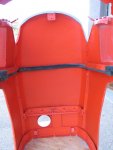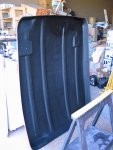Don't go with noise cancelling headphones, bose or otherwise. It has no NRR rating. I called bose directly. It doesn't stop the sound, it just masks it.
Hearing loss is cumulative. You only get one chance.
https://www.amazon.com/3M-Peltor-Ov...e=UTF8&qid=1466163776&sr=1-10&keywords=nrr+33
First, a word or two of background... I've spent over half my life in aviation, working on everything from single engine Cessna-style airplanes to Air Force One, including fast attack aircraft and the biggest of transports and helicopters. In short, I've spent thousands of hours around some of the noisiest machines on earth. I'm also a licensed Aircraft Maintenance Engineer and worked as an avionics manufacturer's tech rep for a dozen years - this job often required me to be standing right beside running turbine engines. I've also been an internationally-competitive shooter in the Olympic pistol disciplines. None of that makes me an expert on noise, but it does let you know that I have a little experience with managing noise since my last audiogram shows no detectable hearing loss.
With all that having been said, the comment above about not using Active Noise Reduction headsets is absolutely incorrect. This type of headset has been used in aviation for 15-20 years and has done a good job of protecting hearing in very high-noise environments. The way an ANR headset works is by sensing the noise outside the headset, then using tiny speakers inside the headset to produce a noise waveform in the exact opposite phase as compared to the "real" noise. The net effect is the noise is cancelled out. Think of it like a bank account. Somebody from outside gives you a dollar, but the bank charges a dollar to deposit it, so you're left with nothing. That's how ANR works. I personally use an ANR headset as the one I take with me from airplane to airplane. It produces very good noise reduction without having lots of clamping force and sweating under the ear seals. The down-side is that it runs on batteries and is far too fragile for tractor work. In my own aircraft I use a headset that is based on custom-molded earplugs and it produces noise reduction that is at least equal to, if not better than the ANR headset, plus they weigh nothing, stay put, don't get tangled in the hair, and don't leak noise around the legs of sunglasses etc.
For shooting I've gone to doubling up my hearing protection; a set of Peltor "Shotgunner" earmuffs on the outside and a set of silicone ear plugs in the ears. Pistols are very loud and this setup has proven to be effective over years of indoor shooting.
There are a lot of options available to us and we will each choose the one that fits us best. If you don't like earplugs because they fall out, try a set that uses an external clamping band. I use these for running the string trimmer and lawnmower as well as woodworking tools and they work fine and stay put.
Our B7510 (new to us just this week!) has a Curtis cab with Hush-a-mat installed in its ceiling. The noise level inside the cab is almost guaranteed to cause permanent hearing loss so I have hung a set of these clamp-style earplugs in the cab:
http://www.safetyawakenings.com/our-favorite-hearing-protection-for-the-safety-person/
Not wearing hearing protection while operating machinery is, at best, unwise. Hearing loss is indeed cumulative and can sneak up on you. Hearing protection is cheap. For those that say you can't hear vital sounds coming from the equipment, all I can say is that's absolutely false. Once you become accustomed to the sound signature of the machine reaching your ears through the hearing protection you will be able to detect abnormalities very easily. Last winter I was operating our MF-135 diesel tractor blowing snow at full power. A small safety chain with a cotter pin on the end was dangling and touching the PTO shaft when the tractor rocked from side to side. I heard that through NRR28 earmuffs. The bad news is that, if you don't wear hearing protection, you may hear some machine sounds today but in a few years time you won't hear ANY sounds.



